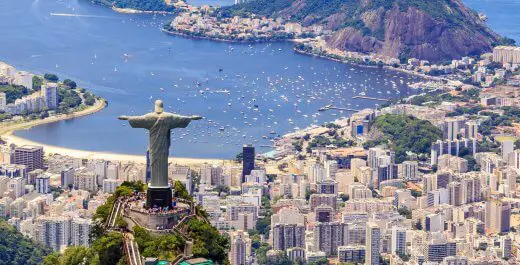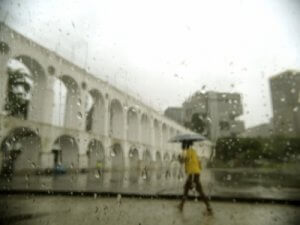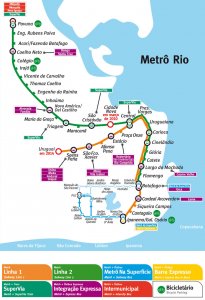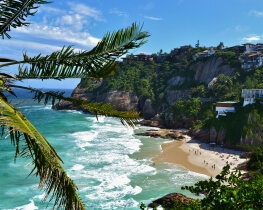Blog
10 Things You Need To Know Before Going To Rio de Janeiro
- Wednesday February 7th, 2024
- Posted by: Amanda Ennes
- Category: Rio de Janeiro

When coming to Rio de Janeiro, you might want to visit the famous tourist sights, such as Sugarloaf Mountain, Copacabana Beach, and Christ the Redeemer statue. However, Rio has so much more to offer. And there are lots of things tourists might not know before coming here for the first time. Do not worry — we are here for you! Check out some cool and interesting facts you need to know before going to Rio de Janeiro!
Table of Contents
Toggle1. Summer rains
 Most tourists probably think about going to Rio de Janeiro during the summertime, right? As a tropical city, one might think it is the best season to enjoy the weather. Well, you are not entirely wrong. The summer in Rio de Janeiro is great. The city is packed up with people from all over the world, the sky is bright blue and the heat might give you a nice tan line.
Most tourists probably think about going to Rio de Janeiro during the summertime, right? As a tropical city, one might think it is the best season to enjoy the weather. Well, you are not entirely wrong. The summer in Rio de Janeiro is great. The city is packed up with people from all over the world, the sky is bright blue and the heat might give you a nice tan line.
However, it is also good to be aware that the heavy rain in Rio normally falls from December to March, right during the summer season in Brazil. During this time of the year, the rainfalls usually occur at the end of the day, which may not compromise your fun at the beach anyway. Yet, the best time to visit Rio de Janeiro is probably April and May when the Marvelous City is still warm, but the humidity is much lower.
Surprisingly, wintertime might also be a good time to visit Rio. Winter in Brazil occurs during June, July, and August. And while Brazilians might love to use coats and jackets during the cooler days, the temperature floats around 26 degrees Celcius, making it amazing weather for beach and sightseeing.
Read more: What is the Best Time to Visit Rio de Janeiro?
2. Tap water
Tap water in Brazil is typically safe to drink, but you do not want to do that. Most Brazilians think it is better to avoid it. They all use filters in their house to make the water safer to drink.
So, in the end, why shouldn’t you drink tap water in Rio? The water in Rio is treated with some chemical components, such as chlorine and fluorine. Old pipes and rust might also affect the water, as well as aluminum found in the plumbing.
Ultimately, it is better to be safe than sorry. Drink filtered water at home and bottled water when out in the city. There is also a recent law that determines all restaurants must offer free filtered water for clients upon request. Just ask for it.
3. Use the subway
 Before going to Rio de Janeiro, keep in mind that the best way to move around the city is by using the subway system. The subway is usually clean, fast, and safe. If you miss the train, another one is coming your way in less than 5 minutes.
Before going to Rio de Janeiro, keep in mind that the best way to move around the city is by using the subway system. The subway is usually clean, fast, and safe. If you miss the train, another one is coming your way in less than 5 minutes.
Rio de Janeiro is a busy city — the traffic is chaotic during rush hours. So if you are unwilling to waste your precious time, just use the subway. Unfortunately, it does not reach every single part of Rio yet, but most touristic neighborhoods are covered. If you need to go to Urca or Cosme Velho, for example — to visit the Sugarloaf Mountain or the Christ the Redeemer statue —, you can not get there by subway. However, a special transit ticket allows you to take an integrated bus to these places.
Further reading: Rio Transit: Ultimate Guide to Public Transportation in Rio de Janeiro.
Be aware of priority seats
In Rio de Janeiro, pregnant women, disabled, and elderly people are given priority for all seats in public transportation. If the wagon is full and you see some of these people, please offer your seat.
Another thing: the second last wagon in the subway is women-only during peak hours. Be aware of that when taking the subway from 6 am to 9 am and 5 pm to 8 pm from Monday to Friday. The wagon is pink on the outside and has a warning sign written on the doors.
4. Try different foods
Do not be scared of trying different things when going to Rio de Janeiro. You should taste everything the cariocas (how people from Rio de Janeiro are called) eat and drink. For example, they usually eat rice and beans in every meal, and ‘prato do dia‘ is a must-try in regular restaurants.
Other traditional food incudes farofa, tapioca, açaí, brigadeiro, and feijoada. Before going to Rio de Janeiro, take a look at our blog post Top 15 – Brazilian foods you must try.
As for drinks, Brazilians love to sit down with friends in bars to have caipirinhas or draft beer. Go along and try some options!
5. Do not flush toilet paper down the toilet
The sewage system in Brazil was not made to handle things like toilet paper, feminine products, and paper towels. So, please do not flush any trash down the toilet or you might experience a big problem with clogging. Most tourists find it weird, but all bathrooms in Brazil have a small trash bin right beside the toilet where you must discard your papers and other things.
6. Tipping
Tipping is not compulsory nor expected in Brazil. As a matter of fact, tips are only common in restaurants, where a standard 10% service fee is already included in the bill. On the other hand, if going to a pub or nightclub, you do not need to worry about tipping. Cashiers are the ones handling cash and tipping the bartender is not common.
7. Enjoy the beaches when going to Rio de Janeiro
 The city of Rio de Janeiro itself has almost 100 different beaches on its coast. However, most of them are polluted in the north zone and city center. Nevertheless, the beaches in the south zone of Rio and Barra da Tijuca are all clean. Each one of them is different from the others and we are sure you will love to visit them all.
The city of Rio de Janeiro itself has almost 100 different beaches on its coast. However, most of them are polluted in the north zone and city center. Nevertheless, the beaches in the south zone of Rio and Barra da Tijuca are all clean. Each one of them is different from the others and we are sure you will love to visit them all.
Check this blog post and learn more about the amazing beaches and plan which ones you are visiting before going to Rio de Janeiro.
At the beach, make sure to buy a canga (a Brazilian lightweight beach towel) and eat biscoito Globo and mate — the most traditional thing to eat at Rio’s beaches is this cookie made of manioc starch served with cold Yerba mate tea.
8. Nightlife in Lapa
You must spend at least one evening in Lapa, as this is the best way to experience the culture in Rio de Janeiro. Lapa is a neighborhood in Rio de Janeiro known for its nightlife, where there is a concentration of bars, nightclubs, and restaurants.
In Lapa, it is easy to find places that play every kind of music, from samba and forró to hip-hop and reggaeton. Many locals also go to Lapa to drink beers and caipirinhas on the sidewalks. Street vendors are always around and you can listen to music from other bars nearby. It is a great cheap option for those who want to have fun and meet people without spending too much money. People use the sidewalks to talk, dance, drink, and enjoy the night.
The most famous nightclubs and concert halls in Lapa are Lapa 40 Graus, Clube Democrata, Rio Scenarium, Fundição Progresso, and Circo Voador.
9. Nearby Cities
There are lots of amazing small cities within the state of Rio de Janeiro and just a few kilometers away from the Marvelous City. If you have time, do not forget to plan a trip to see these other cities nearby. You will not regret it.
Read more on our blog post Smaller Cities to Visit Near Rio de Janeiro.
Niterói
 Just across the Guanabara Bay lays the city of Niterói. You can get there by bus — crossing the 13km Rio-Niterói bridge — or taking the ferry boat at Rio’s city Centre. Niterói has a much calmer vibe than Rio, even though it is a big city with over 500,000 people. The beaches further away from the city center are spectacular and you should visit Itacoatiara Beach. You should also visit Parque da Cidade, a plateau where people go hand gliding and where you have the best view possible from Rio de Janeiro.
Just across the Guanabara Bay lays the city of Niterói. You can get there by bus — crossing the 13km Rio-Niterói bridge — or taking the ferry boat at Rio’s city Centre. Niterói has a much calmer vibe than Rio, even though it is a big city with over 500,000 people. The beaches further away from the city center are spectacular and you should visit Itacoatiara Beach. You should also visit Parque da Cidade, a plateau where people go hand gliding and where you have the best view possible from Rio de Janeiro.
Ilha Grande
Ilha Grande is two hours away from Rio de Janeiro. It is a paradisiac island where cars are not welcome. Spend a few days there and you will immediately fall in love with this village. The nature and vegetation in Ilha Grande are amazing, as it is a protected area. Amazing beaches, great boat tours, and a calmer routine. Tourists love Ilha Grande. Moreover, TripAdvisor often lists Lopes Mendes, one of the beaches in Ilha Grande, as one of the best beaches in the world.
Búzios, Cabo Frio & Arraial do Cabo
The cities of Búzios, Cabo Frio and Arraial do Cabo are around 170km north of Rio de Janeiro. They are tourist cities with great beaches and bohemian vibe. The water there is clear blue and the small city vibe — with cobblestone roads and small houses — makes them great places to chill.
The Mountains
If you are looking for cooler weather, the mountain region near Rio de Janeiro has also great cities to visit, such as Friburgo, Petrópolis, and Teresópolis. These cities are packed with culture and Brazilian history.
10. Safety in Rio de Janeiro
Do not believe everything you read about Rio de Janeiro. The city is as dangerous as any other big city in the world, especially in a country with such social inequality. But you will be fine learning these basic safety rules before going to Rio de Janeiro:
- Be conscious about where to use your smartphone. If you need to check your phone, go inside a drugstore or shopping complex.
- Do not carry your phone in the front pocket of your backpack or the back pocket of your pants or shorts. Pickpocketing is fairly common in Rio, especially in the downtown area.
- Do not leave your personal belongings unsupervised on the beach.
- Do not go out alone at night, avoid dark streets, and prefer to walk around busy areas.
- Use the subway. The network connects all the main tourist areas, it is safe and well-maintained.
- Always have a friend looking out for you if you are drunk.
- Take an Uber to go back home after a night out instead of using the bus or walking home.
- Do not use expensive items on you, such as watches and jewelry.
Golden tip: be aware of your surroundings and use your common sense. Act like a local, be cool, relax, and you will be fine! For more information, read our blog post Is Rio de Janeiro Safe? before going to Rio de Janeiro.
Caminhos Language Centre is the largest and most exciting Portuguese school in Rio de Janeiro, Brazil. We have an excellent infrastructure, over 15 experienced Brazilian teachers, and a friendly multilingual support staff. We are the only school in Brazil able to offer Portuguese group courses throughout the year on 10 different levels. Moreover, our school also offers more than just Portuguese lessons for foreigners, we offer you the complete Rio de Janeiro experience. Every day we organize 100% free and fun activities for you to socialize and practice your Portuguese. We can also help you with a student visa for Brazil and accommodation in Rio de Janeiro. Follow us on Instagram for some Portuguese tips and news.


 Deutsch
Deutsch Français
Français Português
Português Español
Español

Parabéns pelo informativo artigo sobre o que saber antes de visitar o Rio de Janeiro. As dicas fornecidas são essenciais para qualquer visitante e refletem o espírito acolhedor da cidade. Como parte da equipe Água Doce Caminhão Pipa, apreciamos guias que valorizam a experiência cultural e prática dos turistas.